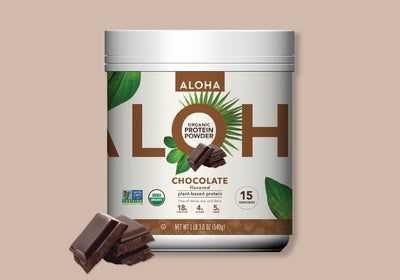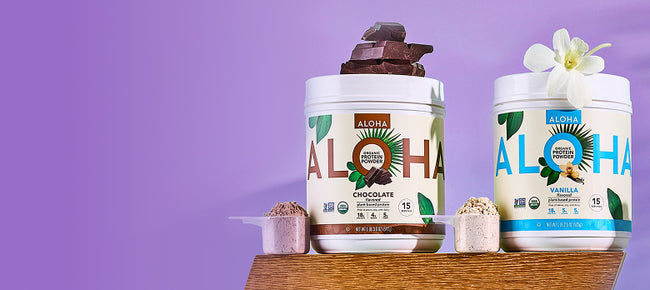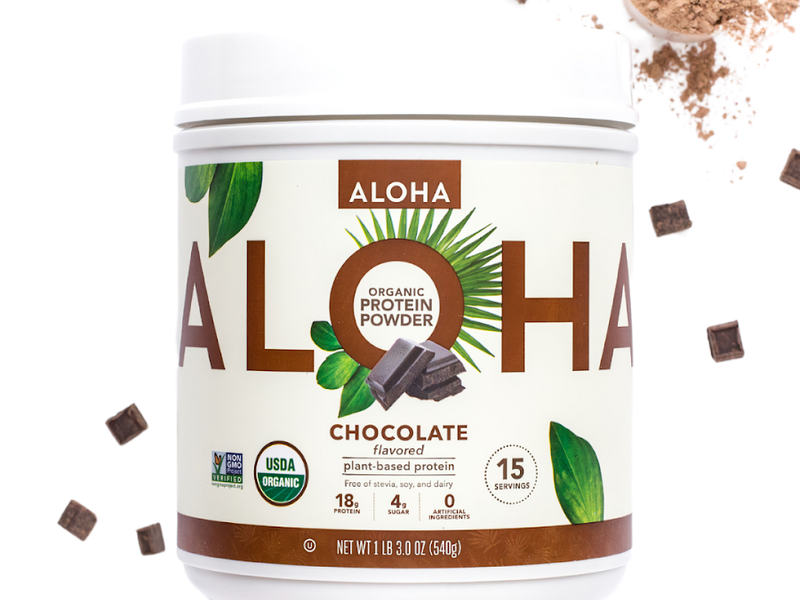
 collection header image
collection header image
 collection header image
collection header image
Protein Powders
Key Takeaways:
- Clean Ingredients Matter: The best chocolate protein powders feature organic, plant-based ingredients, free from artificial additives and unnecessary fillers.
- Supports Recovery and Energy: Chocolate protein powder fuels muscle repair, replenishes energy stores, and reduces post-workout soreness with a delicious taste.
- Versatile and Easy to Use: From smoothies to baked goods, chocolate protein powder is a flexible option for any diet, making it easy to stay on track with health goals.
What To Look For In The Best Chocolate Protein Powder
Finding the best chocolate protein powder means focusing on what truly matters—ingredients, taste, and nutrition. A product that balances these aspects is effective and enjoyable to use daily. Let’s break down the key features to guide your choice:
- Clean, Plant-Based Ingredients: A high-quality chocolate protein powder starts with clean, plant-based ingredients. Options like vegan protein powder and plant protein powder offer organic and non-GMO choices that are healthier for you and better for the environment. Avoid powders with artificial sweeteners or unnecessary fillers, as these can interfere with your goals and leave you feeling sluggish.
- Flavor and Texture That Excite Your Taste Buds: Protein powder shouldn’t taste like chalk or give you a gritty texture. The best chocolate protein powders deliver a rich, satisfying flavor that indulges every shake. Blending smoothly into water, milk, or smoothies ensures it fits seamlessly into your routine, making your health journey easier.
- A Balanced Nutritional Profile: Your protein powder should work as hard as you do by delivering the nutrients your body craves. Look for options with a healthy balance of protein, fiber, and minimal added sugars to keep you energized without unwanted extras. A balanced profile also supports muscle recovery and energy replenishment after workouts.
- Versatility in Your Diet: The right chocolate protein powder isn’t just for shakes—it should be versatile enough to enhance your favorite recipes. From smoothies to pancakes or energy balls, even non whey protein powder fits seamlessly into your lifestyle. This flexibility keeps your diet exciting while ensuring you’re meeting your nutritional needs.
Focusing on these qualities will help you find a chocolate protein powder that aligns with your values, tastes amazing, and supports your health goals.
Benefits Of Choosing A Plant-Based Chocolate Protein Powder
Plant-based chocolate protein powders aren’t just a trend but a game-changer for anyone seeking clean, sustainable, and effective nutrition. By skipping animal-based proteins, you’re embracing a gentler product on your body and better for the environment. Here’s why plant-based protein powders stand out:
Gentle On Digestion
Plant-based powders are naturally easier to digest than whey or other dairy-based proteins. Ingredients like pea protein and brown rice protein are less likely to cause bloating, gas, or discomfort. This makes them a great choice for anyone with dairy sensitivities or those looking to avoid heaviness after a shake.
Packed With Nutrients Beyond Protein
Plant-based powders often contain additional nutrients like fiber, vitamins, and minerals. These extras support overall health, helping digestion, energy, and even immune function. A plant-based option ensures you fuel your body with more than just protein.
Supports A Sustainable Lifestyle
Choosing plant-based protein powders means reducing your environmental footprint. Producing plant proteins requires fewer resources like water and land than animal-based proteins. By opting for a plant-based option, you’re making a choice that’s as kind to the planet as it is to your body.
Great For A Variety Of Diets
Plant-based protein powders fit seamlessly into various diets, from vegan to flexitarian. They’re free from common allergens like dairy, and many are also gluten-free, making them suitable for various dietary needs. This versatility ensures everyone can enjoy the benefits without compromise.
Rich, Satisfying Flavor Profiles
Plant-based powders have come a long way in taste, especially chocolate options. Natural sweeteners and rich cocoa blends deliver indulgent flavors without artificial additives. A plant-based chocolate protein powder ensures you get a guilt-free treat that doesn’t sacrifice taste for health.

How Chocolate Protein Powder Supports Muscle Recovery And Growth
A good chocolate protein powder isn’t just a treat—it’s essential to any active lifestyle. Whether hitting the gym, running, or practicing yoga, your muscles need the proper nutrients to recover and rebuild. Here’s how chocolate protein powder helps you bounce back stronger:
Provides Essential Amino Acids
Chocolate protein powders from plant-based sources like pea, hemp, and pumpkin seed proteins offer a complete amino acid profile. Amino acids are the building blocks of muscle repair and growth, making them vital after a workout. These nutrients ensure your body has what it needs to repair microtears and support lean muscle development.
Replenishes Energy Stores
After exercise, your body’s glycogen stores can become depleted, leaving you feeling fatigued. Many chocolate protein powders include a touch of natural sugars or carbs to help restore these energy levels. This replenishment helps you recover faster and prepares you for your next workout.
Reduces Muscle Soreness
Protein powder supports faster muscle recovery by reducing inflammation and soreness after intense workouts. Plant-based proteins, in particular, are gentle on the stomach, helping you refuel without discomfort. A chocolate protein shake post-workout is a simple way to soothe your body while satisfying your taste buds.
Promotes Consistent Progress
Regularly incorporating protein into your diet ensures your muscles have the fuel to grow stronger over time. A consistent protein routine helps you maintain progress, whether your goal is building strength, toning, or improving endurance. Chocolate protein powder makes this habit easy and enjoyable.
Top Recommendation: ALOHA Chocolate Protein Powder
When finding the best chocolate protein powder, ALOHA Chocolate Protein Powder stands out as a top choice. Crafted with clean, plant-based ingredients, it nourishes your body while delivering a rich, chocolatey flavor. Whether blending it into smoothies or simply shaking it with milk, ALOHA offers a delicious and health-conscious way to meet your nutritional needs.
ALOHA’s formula is built on USDA-certified organic and non-GMO ingredients, including a blend of pea, pumpkin seed, and hemp seed proteins for a complete amino acid profile. With 18 grams of protein and 5 grams of fiber per serving, it’s a nutritional powerhouse perfect for post-workout recovery or a midday energy boost. Sweetened naturally with coconut sugar and monk fruit, it satisfies chocolate cravings without the guilt or sugar crash.
Beyond its health benefits, ALOHA is allergy-friendly and environmentally responsible. Free from dairy, soy, gluten, and artificial additives, it’s gentle on digestion and suitable for various dietary needs. Their commitment to sustainability is evident in their responsibly sourced ingredients and recyclable packaging, making ALOHA a protein powder that’s as good for the planet as it is for your body.
How To Incorporate Chocolate Protein Powder Into Your Diet
Chocolate protein powder isn’t just for shakes—it’s a versatile ingredient that can add flavor and nutrition to a variety of meals and snacks. Whether you’re a busy professional or a fitness enthusiast, there are plenty of easy and delicious ways to make it part of your daily routine. Here are some ideas to get started:
Start Your Day With A Smoothie
Try starting your morning with a recipe from how to make a protein shake by blending chocolate protein powder with your favorite milk, a banana, and a handful of spinach for a nutrient-packed breakfast. Add extra nut butter or chia seeds for even more flavor and benefits. It’s a quick, energizing way to kickstart your morning and keep you full until lunch.
Upgrade Your Baking
Swap some of the flour in your recipes for chocolate protein powder to make high-protein treats. Pancakes, muffins, and brownies are all great options that become healthier without sacrificing taste. This is perfect for meal-prepping snacks that feel indulgent but support your goals.
Use It As A Snack Booster
Mix chocolate protein powder into yogurt, oatmeal, or a cup of coffee for a midday energy boost. It blends seamlessly and adds a rich, chocolatey flavor that satisfies cravings while keeping you on track. You can also check out how to make protein shakes taste better for inspiration on how to enhance flavor and texture in your daily routine.
Create Protein-Packed Energy Balls
Combine chocolate protein powder with oats, nut butter, and honey to roll into bite-sized energy balls. These are perfect for grab-and-go snacks or pre-workout fuel. Customize them with mix-ins like shredded coconut or mini chocolate chips for added texture and flavor.
Make A Post-Workout Shake
After exercise, mix your chocolate protein powder with cold water or plant-based milk for a simple recovery drink. It quickly prepares and gives your body the necessary nutrients to rebuild and recover. Plus, the chocolate flavor makes it feel like a reward for your hard work.
Organic Vs. Non-Organic: Why Quality Matters In Chocolate Protein Powder
When it comes to chocolate protein powder, not all options are created equal. Choosing between organic and non-organic can significantly impact the product's quality and benefits. Let’s explore why organic chocolate protein powder is worth considering:
Free From Harmful Pesticides And Chemicals
Organic protein powders are made from ingredients grown without synthetic pesticides, herbicides, or fertilizers. This means avoiding potentially harmful chemicals that can linger in non-organic options. Choosing organic is not just better for your body—it’s better for the planet, too.
Cleaner Ingredients You Can Trust
Organic chocolate protein powders typically come with transparent labeling and cleaner ingredient lists. They avoid artificial flavors, colors, and preservatives often found in non-organic powders. With fewer additives, you’re fueling your body with high-quality nutrition that aligns with your wellness goals.
Better Nutritional Value
Studies suggest that organic crops may have higher levels of certain vitamins, minerals, and antioxidants than their conventional counterparts. When you choose an organic chocolate protein powder, you get a product rich in nutrients and free from unnecessary extras. This helps maximize the benefits of every scoop.
Environmentally Friendly Practices
Organic farming methods focus on sustainability, prioritizing soil health and biodiversity. By choosing organic protein powder, you support practices that are kinder to the environment. It’s a small but meaningful step toward reducing your ecological footprint.
Peace Of Mind In Every Scoop
With organic certification, you know exactly what you’re getting—no hidden surprises or questionable sourcing. If you’re exploring flavors, best vanilla protein powder options may also align with these organic standards while offering delicious variety. This peace of mind is invaluable regarding products you use regularly. An organic option ensures your chocolate protein powder is as pure and wholesome as it tastes.
Read also:
What makes ALOHA’s chocolate protein powder stand out as the best chocolate protein powder for people trying to eat more plant-based?
At ALOHA, we believe the best chocolate protein powder should do more than just deliver protein—it should support your lifestyle with real ingredients and no compromises. That’s why we keep our formula simple, wholesome, and entirely plant-based, using organic peas, brown rice, pumpkin seeds, and hemp seeds to pack in 18 grams of clean protein per serving.
We leave out soy and stevia because we know what it’s like to search for something that feels good on your body and tastes good, too. Instead, we sweeten with organic coconut sugar and monk fruit for a naturally smooth, chocolatey taste that fits into any part of your day—smoothies, oats, even baking.
And because we’re an employee-owned, Certified B Corp, every bag supports more than your health—it helps strengthen fair farming practices, community programs, and sustainability. When you choose ALOHA, you’re choosing a product that cares as much as you do.
Why is it important that ALOHA’s chocolate protein powder is soy-free?
We leave soy out of our chocolate protein powder because we’re committed to making nutrition more accessible and gentle on your system. Whether you have a sensitivity, an allergy, or just prefer to avoid soy, our formula offers clean plant-based protein without compromise.
Instead, we use a thoughtful blend of peas, brown rice, hemp seeds, and pumpkin seeds—ingredients that offer a complete amino acid profile and are easy to digest. Going soy-free is one way we help more people feel good about their nutrition, while still getting the fuel they need to move through their day.
It’s part of our larger promise: to craft products with integrity, transparency, and care—because we believe healthy living should be simple and stress-free.
How does ALOHA’s chocolate protein powder support a feel-good daily routine?
Our chocolate protein powder is made to support the rhythms of everyday life—whether you’re heading to the gym, working from home, or just trying to make breakfast a little easier. With its rich, smooth chocolate flavor and 18 grams of plant-based protein, it turns your daily routine into something you actually look forward to.
We’ve included ingredients like organic coconut sugar, monk fruit, and fiber-rich prebiotics so that each serving supports sustained energy, digestion, and fullness—without the weird aftertaste or artificial extras.
For us, it’s not just about what’s in the scoop. It’s about how it fits into your life. That’s why we keep our ingredients clean, our mission honest, and our products as enjoyable as they are nourishing.
What are the ingredients that make ALOHA’s chocolate protein powder a good choice?
Every ingredient in our chocolate protein powder is there for a reason. We blend plant-based proteins from peas, pumpkin seeds, hemp seeds, and brown rice to give you a complete amino acid profile—ideal for recovery, daily energy, and balance.
We sweeten with organic coconut sugar and monk fruit for a naturally smooth flavor, and include blue agave inulin for digestion-friendly fiber. MCT oil from coconuts provides a clean energy source that supports focus and metabolism.
Just as important is what we leave out: soy, dairy, stevia, and artificial fillers. The result? A USDA Organic, Non-GMO protein powder made by people who care deeply about what goes into your body—and what’s left out.
If you’re deciding between creatine vs protein powder for your wellness goals, or simply exploring what to mix protein powder with to keep your routine fresh and satisfying, our chocolate blend offers a clean, versatile foundation you can trust.
How does ALOHA’s chocolate protein powder fit into an active lifestyle?
Whether you’re lifting weights, chasing your kids, or hiking your favorite trail, our chocolate protein powder is a clean, simple way to support your active lifestyle. With 18 grams of plant-based protein per serving and none of the stuff that weighs you down—like soy, dairy, or artificial ingredients—it helps fuel movement and recovery without compromise.
We designed it to be easy on your stomach and even easier to blend into your routine. Scoop it into a shake, bake it into a snack, or stir it into your morning oats. No clumps, no guesswork—just clean fuel you can trust.
As an employee-owned company and Certified B Corp, we also design every product with sustainability and community care in mind. Because we believe what supports your body should support the planet, too.
Sources:
1. Church, D. D., Hirsch, K. R., Park, S., Kim, I.-Y., Gwin, J. A., Pasiakos, S. M., Wolfe, R. R., & Ferrando, A. A. (2020). Essential Amino Acids and Protein Synthesis: Insights into Maximizing the Muscle and Whole-Body Response to Feeding. Nutrients, 12(12), 3717. https://doi.org/10.3390/nu12123717
2. Karabulut, G., Goksen, G., & Mousavi Khaneghah, A. (2024). Plant-based protein modification strategies towards challenges. Journal of Agriculture and Food Research, 15, 101017. https://doi.org/10.1016/j.jafr.2024.101017
3. Clem, J., & Barthel, B. (2021). A Look at Plant-Based Diets. Missouri Medicine, 118(3), 233. https://pmc.ncbi.nlm.nih.gov/articles/PMC8210981/
4. Kaur, L., Mao, B., Beniwal, A. S., Abhilasha, Kaur, R., Chian, F. M., & Singh, J. (2022). Alternative proteins vs animal proteins: The influence of structure and processing on their gastro-small intestinal digestion. Trends in Food Science & Technology, 122, 275–286. https://doi.org/10.1016/j.tifs.2022.02.021
5. Hertzler, S. R., Lieblein-Boff, J. C., Weiler, M., & Allgeier, C. (2020). Plant Proteins: Assessing Their Nutritional Quality and Effects on Health and Physical Function. Nutrients, 12(12), 3704. https://doi.org/10.3390/nu12123704
6. Arora, S., Kataria, P., Mansi Nautiyal, Ishika Tuteja, Sharma, V., Ahmad, F., Haque, S., Shahwan, M., Esra Capanoglu, Rahul Vashishth, & Arun Kumar Gupta. (2023). Comprehensive Review on the Role of Plant Protein As a Possible Meat Analogue: Framing the Future of Meat. https://doi.org/10.1021/acsomega.3c01373
7. Sim, S. Y. J., Srv, A., Chiang, J. H., & Henry, C. J. (2021). Plant Proteins for Future Foods: A Roadmap. Foods, 10(8), 1967. https://doi.org/10.3390/foods10081967
8. Gil, M., Rudy, M., Duma-Kocan, P., Stanisławczyk, R., Krajewska, A., Dziki, D., & Hassoon, W. H. (2024). Sustainability of Alternatives to Animal Protein Sources, a Comprehensive Review. Sustainability, 16(17), 7701–7701. https://doi.org/10.3390/su16177701
ALOHA's products are not intended to treat, diagnose, mitigate, prevent, or cure disease. ALOHA's products should not replace prescribed medications or the variety of foods important to a healthful diet.
Do not self-diagnose any health condition. Work with your healthcare provider to determine how best to achieve optimal health.
